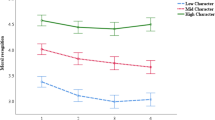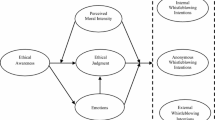Abstract
Within the theoretical framework of the moral intensity model of ethical decision making (Jones, 1991), two studies ascertained the contention that ethicality judgements are contingent upon the perceived intensity of the moral issue. In addition, Study 1 extended the validity of the moral intensity notion to whistle-blowing behaviour; Study 2 addressed the effect of the individual difference variable, need-for-cognition, on differential utilization of intensity dimensions in the ethical decision process. A scenario approach was used in both studies. Results have provided convergent support for the issue-contingency nature of ethical decisions. Study 1 also showed that felt empathy for potential victims predicted the likelihood of whistle-blowing behaviour, and that the perceived overall ethicality of a wrongdoing predicted felt empathy when potential victims are psychologically and physically close. Results of Study 2 further suggested a greater utilization of issue-relevant information by high need-for-cognition individuals in ethical decision making.
Similar content being viewed by others
References
Armstrong, R. W. and J. Sweeney: 1994, ‘Industry Type, Culture, Mode of Entry and Perceptions of International Marketing Ethics Problems: A Cross-Cultural Comparison’, Journal of Business Ethics 13, 775–785.
Batson, C. D. and J. S. Coke: 1981, ‘Empathy: A Source of Altruistic Motivation for Helping’, in J. P. Rushton and R. M. Sorrentino (eds), Altruism and Helping Behaviour: Social, Personality and Developmental Perspectives(Erlbaum, Hillsdale, NJ), pp. 167–187.
Batson, C., B. D. Duncan, T. B. Ackerman, T. Buckley and K. Birch: 1981, ‘Is Empathy a Source of Altruistic Motivation?’, Journal of Personality and Social Psychology 40, 290–302.
Bayles, M. D., ed.: 1968, Contemporary Utilitarianism(Doubleday, New York).
Brandt, R.: 1959, Ethical Theory(Prentice-Hall, Englewood Cliffs, NJ).
Brief, A. P. and S. J. Motowidlo: 1986, ‘Prosocial Organizational Behaviours’, Academy of Management Review 11, 710–725.
Cacioppo, J. T. and R. E. Petty: 1982, ‘The Need for Cognition’, Journal of Personality and Social Psychology 42, 116–131.
Cacioppo, J. T., R. E. Petty and C. F. Kao: 1984, ‘The Efficient Assessment of the Need for Cognition’, Journal of Personality Assessment 48, 306–307.
Cacioppo, J. T., R. E. Petty, C. F. Kao and R. Rodriguez: 1986, ‘Central and Peripheral Routes to Persuasion: An Individual difference Perspective’, Journal of Personality and Social Psychology 51, 1032–1043.
Cacioppo, J. T., R. E. Petty and K. J. Morris: 1983,’ Effects of Need for Cognition on Message Evaluation, Recall and Persuasion’, Journal of Personality and Social Psychology 45, 805–818.
Cohen, A. R., E. Stotland and D. M. Wolfe: 1995, ‘An Experimental Investigation of Need for Cognition’, Journal of Abnormal and Social Psychology 51, 291–294.
Coke, J. S., C. D. Bastonand and K. McDavis: 1978,’ Empathic Mediation of Helping: A Two-Stage Model’, Journal of Personality and Social Psychology 36, 752–766.
DeGeorge, R. T.: 1990, Business Ethics, 3rd Ed. (Macmillan, New York).
Dozier, J. B. and M. P. Miceli: 1985, ‘Potential Predictors of Whistle-Blowing: A Prosocial Behaviour Perspective’, Academy of Management Review 10, 823–836.
Dubinsky, A. J. and B. Loken: 1989, ‘Analyzing Ethical Decision Making in Marketing’, Journal of Business Research 19, 83–107.
Dukerich, J. M., M. J. Waller, E. George and G. P. Huber: 1993, ‘Moral Intensity in Group Problem Solving’, Paper presented at the National Academy of Management Meetings, Atlanta, GA.
Dunegan, K. J.: 1993, ‘Framing, Cognitive Modes, and Image Theory: Towards an Understanding of a Glass Half Full’, Journal of Applied Psychology 78, 491–503.
Ewing, D. W.: 1983, Do It My Way - Or You're Fired!(Wiley & Sons, New York).
Farrell, O. C. and L. G. Gresham: 1985, ‘A Contingency Framework for Understanding Ethical Decision Making in Marketing’, Journal of Marketing 29, 87–96.
Fazio, R. H.: 1990, ‘Multiple Processes by which Attitudes Guide Behavior: The Mode Model a an Integrative Framework’, in M. P. Zanna (ed.), Advances in Experimental Social Psychology(vol. 23) (Academic Press, San Diego, CA), pp. 75–109.
Ford, R. C. and W. D. Richardson: 1994, ‘Ethical Decision Making: A Review of the Empirical Literature’, Journal of Business Ethics 13, 205– 221.
Fritzche, D. J.: 1988, ‘An Examination of Marketing Ethics: Role of the Decision Maker, Consequences of the Decision, Management Position and Sex of the Respondent’, Journal of Macromarketing,Fall, 29–39.
Glazer, M. P. and P. M. Glazer: 1986, ‘Whistleblowing’, Psychology Today, August, 36–43.
Graham, J. W.: 1986, ‘Principled Organizational Dissent: A Theoretical Essay’, in B. M. Staw and L. L. Cummings (eds.), Research in Organizational Behaviour, Vol. 8 (JAI Press, Greenwich, CT), pp. 1–52.
Hann, N.: 1983, ‘An Interactional Morality of Everyday Life’, in N. Hann, R. H. Bellah, P. Rabinow and W. M. Sullivan (eds.), Social Science as Moral Inquiry(Columbia University Press, New York), pp. 218–250.
Hogan, R.: 1973, ‘Moral Conduct and Moral Character: A Psychological Perspective’, Psychological Bulletin 79, 217–232.
Hornstein, H. A.: 1978, ‘Promotive Tension and Prosocial Behaviour: A Lewinian Analysis’, in L. Wispe (ed.), Altruism, Sympathy, and Helping: Psychological and Sociological Principles(Academic Press, New York), pp. 177–207.
Jones, T. M.: 1991, ‘Ethical Decision Making by Individuals in Organizations: An Issue-Contingent Model’, Academy of Management Review 16, 366– 395.
Jones, T. M. and V. L. Huber: 1992, ‘Issue Contingency in Ethical Decision Making’, International Association for Business and Society Proceedings, 156–166.
Kahn, W. A.: 1990, ‘Toward an Agenda for Business Ethics Research’, Academy of Management Review 15, 311–328.
Kant, I.: 1964, Groupwork of the Metaphysics of Morals(Harper & Row, New York).
Khalil, O. E. M.: 1993, ‘Artificial Decision-Making and Artificial Ethics: A Management Concern’, Journal of Business Ethics 12, 313–321.
Klein, H. J.: 1989, ‘An Integrated Control Theory Model of Work Motivation’, Academy of Management Review 14, 150–172.
Knouse, S. B. and R. A. Giacalone: 1992, ‘Ethical Decision-Making in Business: Behavioral Issues and Concerns’, Journal of Business Ethics 11, 369–377.
Kohlberg, L.: 1973, ‘The Claim to Moral Adequacy of a Highest Stage of Moral Judgement’, Journal of Philosophy 70, 630–646.
Kohlberg, L.: 1976, ‘Moral Stages and Moralization: The Cognitive-Developmental Approach’, in T. Lickona (ed.), Moral Development and Behavior: Theory, Research and Social Issues(Holt, Rinehart & Winston, New York).
Krebs, D.: 1975, ‘Empathy and Altruism’, Journal of Personality and Social Psychology 32, 1134–1146.
Latane, B. and J. M. Darley: 1968, ‘Group Inhibition of Bystander Intervention’, Journal of Personality and Social Psychology 10, 215–221.
Latane, B. and J. M. Darley: 1970, The Unresponsive Bystander: Why Doesn't He Help?(Appleton-Century Cliffs, New York).
Lessiter, D. G., M. A. Briggs and R. E. Bowman: 1991, ‘Need for Cognition and the Perception of Ongoing Behavior’, Personality and Social Psychology Bulletin 17, 156–160.
Lessiter, D. G., M. A. Briggs and R. D. Slaw: 1991, ‘Need for Cognition, Causal Processing and Memory for Behavior’, Personality and Social Psychology Bulletin 17, 694–700.
Lichenstein, T. K. and M. Rothbart: 1985, ‘Associative storage and Retrieval Processes in Person Memory’, Journal of Experimental Psychology: Learning, Memory and Cognition 11, 316–345.
Lord, R. G. and K. J. Maher: 1990, ‘Alternative Information-Processing Models and Their Implications for Theory, Research and Practice’, Academy of Management Review 15, 9–28.
Lyons, D.: 1965, Forms and Limits of Utilitarianism(Oxford University Press, Oxford).
Macheswaran, D. and S. Chaiken: 1991, ‘Promoting Systematic Processing in Low-Motivation Settings: Effects of Incongruent Information on Processing and Judgement’, Journal of Personality and Social Psychology 61, 13–25.
Malin, M. H.: 1983, ‘Protecting the Whistle-blower form Retaliatory Discharge’, University of Michigan Journal of Law Reform 16, 277–318.
Miceli, M. P. and J. P. Near: 1985, ‘Characteristics of Perceived Wrongdoing and Organizational Climate Associated with Whistle-blowing Decisions’, Personnel Psychology 38, 525–544.
Miceli, M. P. and J. P. Near: 1992, Blowing the Whistle: The Organizational and Legal Implications for Companies and Employees(Lexington Books, New York).
Moberg, D. J.: 1989, ‘The Ethics of Impression Management’, in R. A. Giacalone and P. Rosenfeld (eds.), Impression Management in the Organization(Erlbaum, Hillsdale, NJ), pp. 377–396.
Morris, S. A. and R. A. McDonald: An Empirical Investigation', Journal of Business Ethics 14, 715– 726.
Near, J. P. and T. C. Jensen: 1983, ‘The Whistleblowing Process: Retaliation and Perceived Effectiveness’, Work and Occupations 10, 3–28.
Near, J. P. and M. P. Miceli: 1986, ‘Retaliation Against Whistle-blowers: Predictors and Effects’, Journal of Applied Psychology 71, 137–145.
Near, J. P. and M. P. Miceli: 1987, ‘Whistle-blowers in Organizations: Dissidents or Reformers?’, in B. M. Staw and L. L. Cummings (eds.), Research in Organizational Behaviour(Vol. 9) (JAI Press, Greenwich, CT), pp. 321–368.
Parmerlee, M. A., J. P. Near and T. C. Jensen: 1982, ‘Correlates of Whistle-blowers' Perceptions of Organizational Retaliation’, Administrative Science Quarterly 7, 17–34.
Petty, R. E. and J. T. Cacioppo: 1986, Communication and Persuasion: Central and Peripheral Routs to attitude Change(Springer-Verlag, New York).
Petty, R. E., J. T. Cacioppo and J. A. Kasmer: 1985, ‘Individual Differences in Social Loafing on Cognitive Tasks’, Paper presented at the meeting of the Midwestern Psychological Association, Chicago.
Piaget, J.: 1965, The Judgment of the Child(Free Press, New York).
Ralin, J. A.: 1987, ‘The Professional as the Executive's Ethical Aide-de-camp’, Academy of Management Executive 1, 171–182.
Rawls, J.: 1971, A Theory of Justice(Harvard University Press, Cambridge, Massachusetts).
Rossouw, G. J.: 1994, ‘Rational Interaction for Moral Sensitivity: A Postmodern Approach to Moral Decision-making in Business’, Journal of Business Ethics 13, 11–20.
Scudder, J. N., R. T. Herschel and M. D. Crossland: 1994, ‘Test of a Model Linking Cognition Motivation, Assessment of Alternatives, Decision Quality and Group Process Satisfaction’, Small Group Research 25, 57–82.
Singer, M.: 1995, ‘The Role of Moral Intensity and Fairness Perception in Judgements of Ethicality: A Comparison of Managerial Professionals and the General Public’, Journal of Business Ethics, in press.
Singer, M. and A. Singer: 1995, ‘Observer Judgements about Moral Agents' Ethical Decisions: The Role of Scope of Justice and Moral Intensity’, Journal of Business Ethics, in press.
Soeken, K. L. and D. R. Soeken: 1987, ‘A Survey of Whistle-blowers: Their Stressors and Coping Strategies’, Proceedings of the Hearing on H.R. 25 (US Government Printing Office, Washington DC), pp. 156–166.
Tevino, L. K.: 1986, ‘Ethical Decision Making in Organizations: A Person-situation Interactionist Model’, Academy of Management Review 11, 601– 617.
Trevino, L. K., C. D. Sutton and R. W. Woodman: 1985, ‘Effects of Reinforcement Contingencies and Cognitive Moral Development on Ethical Decision-making Behavior’, Paper presented at the Annual Meeting of the Academy of Management, San Diego.
Velasquez, M. G.: 1982, Business Ethics: Concepts and Cases(Prentice-Hall, Englewood Cliffs, NJ).
Verplanken, B.: 1993, ‘Need for Cognition and External Information Search: Responses to Time Pressure during Decision Making’, Journal of Research in Personality 27, 238–252.
Verplanken, B., P. T. Hazenherg and G. P. Palenewen: 1992, ‘Need for Cognition and External Information Search’, Journal of Research in Personality 26, 128–136.
Victor, B. and J. B. Cullen: 1988, ‘The Organizational Bases of Ethical Work Climates’, Administrative Science Quarterly 33, 101–125.
Victor, B., L. K. Trevino and D. L. Shapiro: 1993, ‘Peer Reporting of Unethical Behavior: The Influence of Justice Evaluations and Social Context Factors’, Journal of Business Ethics 12, 253–263.
Weinstein, D.: 1979, Bureaucratic Opposition(Pergamon Press, New York).
Westin, A. F., ed.: 1981, Whistle-blowing: Loyalty and Dissent in the Corporation(McGraw-Hill, New York).
Wofford, J. C. and V. L. Goodwin: 1990, ‘Effects of Feedback on Cognitive Processing and Choice of Decision Style’, Journal of Applied Psychology 75, 603–612.
Rights and permissions
About this article
Cite this article
Singer, M., Mitchell, S. & Turner, J. Consideration of Moral Intensity in Ethicality Judgements: Its Relationship with Whistle-blowing and Need-for-Cognition. Journal of Business Ethics 17, 527–541 (1998). https://doi.org/10.1023/A:1005765926472
Issue Date:
DOI: https://doi.org/10.1023/A:1005765926472




